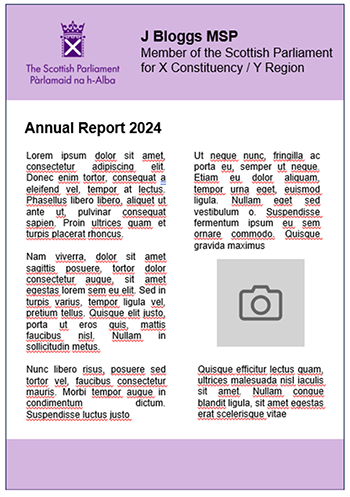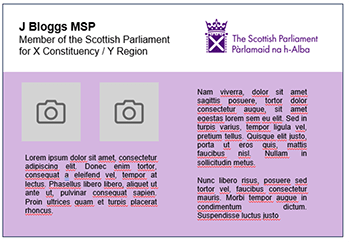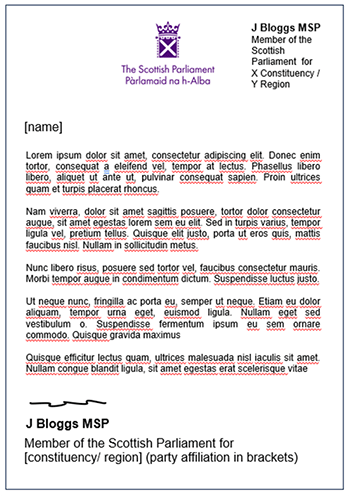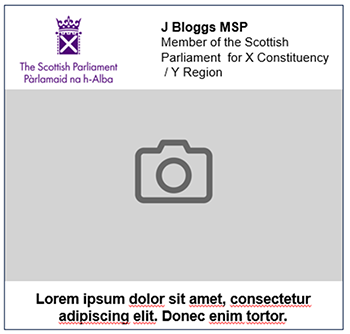Parliament policies
Policy on Members' Parliamentary-funded communications
General
1. Members may only use parliamentary resources to meet the costs of producing and distributing publications which inform constituents about the work of Parliament or the way in which they have carried out their parliamentary duties in the Parliament or locally within the constituency or region for which they were elected. For the purpose of this policy document, a publication is: an annual report, newsletter, circular letter, leaflet, survey, or web material used to contact or consult with constituents or local groups, or adverts, banners, signage and hoardings which provide information about how to contact a Member.
2. Publications can either be in printed or digital format.
3. Circulated publications must not be distributed outside a Member’s electoral area. Regional Members are also reminded that, under rule 8.5 of the Code of Conduct for Members, they have a responsibility to all those in the region for which they were elected, and they must work in more than two constituencies within their region.
4. The Parliament’s Corporate Identity must appear on Member’s parliamentary-funded communications. Please contact the Allowances Office for copies of this. See Annex A for more information on use of the Corporate Identity and examples of this.
5. Where costs have been incurred in the printing and/ or preparation of any publication, which includes staff time paid for from the Members’ Expenses Scheme, it must include a statement which is clearly legible in the following terms:
'The costs of this publication have been met from parliamentary resources'.
The only exceptions to this are Parliamentary business cards or letters printed on Parliament headed paper which do not need to include this statement.
Content
6. Publications funded from parliamentary resources must be factual and relate to the Member’s work as a parliamentarian. This does not include a Member’s work as a party spokesperson or member of the Scottish Government.
7. Parliamentary funded publications must not include:
- Any material that promotes the political views of any person, political party, the government, or other organisation involved in political campaigning
- Any material that criticises any person, political party, the government, or other organisation involved in political campaigning
- Any material that promotes, criticises, or campaigns for or against anyone seeking election
- Material likely to provide a personal benefit to a Member or other person or organisation
- Communications that are non-parliamentary in nature including greetings messages or messages which promote commercial enterprises
- Fundraising of any kind.
8. Publications can refer to the “Scottish Government”, "UK Government" or the “Government”, but must not refer to the Government by party.
9. Any reference to a government initiative should be factual in nature and directly related to how it impacts on the Member’s electoral area or how it links to the parliamentary duties of the Member in Parliament or the constituency/region.
Surveys
10. As set out in paragraph 7, surveys or any other publication paid for from parliamentary resources must not be used for party political or campaigning purposes and therefore constituents’ personal data cannot be made available to third parties including, in particular, political parties or national political campaign organisations.
Further information about the use of SPCB material and SPCB Copyright Licence
11. To make this clear to constituents, any survey or publication must include a disclaimer, which is clearly legible in the following term:
‘The personal data provided in this survey is to inform my parliamentary work and will not be shared with third parties including campaign or political organisations.'
12. When seeking information from constituents which includes personal data in the form of a survey or other publication, Members must comply with the Data Protection Act 2018 (DPA) and the UK General Data Protection Regulation (UK GDPR). To comply with data protection requirements, you must issue constituents with privacy information in the form of a privacy notice which explains how you will process their personal data for the purposes of carrying out the survey. More information about this is available for Members and their staff on the Parliament’s Data Protection intranet pages.
13. A breach of the data protection requirements set out in the UK GDPR can have significant repercussions including sanctions from the UK Information Commissioner to the data controller which in this case is the MSP, claims for compensation from individuals who have been effected by a data breach or commission of an offence under the DPA. For advice and guidance on data protection contact dataprotection.officer@parliament.scot
Websites
14. The policy on content also applies to material made available on Members’ websites that have been funded from parliamentary resources. Live feeds from social media platforms can only be included on parliamentary-funded website if the content of these meets the requirements of this policy and is not party political. Members may provide links to external websites, including social media platforms provided there is a disclaimer highlighting that the SPCB has no responsibility over the content of external websites or social media platforms.
Party Affiliation and use of other logos and images
15. Whilst Members may choose to include in a publication a reference to their party affiliation together with the description of their electoral status alongside their name, it is not a requirement of the policy to do so. However, where it is included, it is not acceptable to incorporate such information beside the Parliament’s Corporate Identity or within half a page of it. Where a Member refers to their parliamentary political party it must not be above the mid-line on any page and can only be included by using the following template:
"[Members’ Name]
Member of the Scottish Parliament for [constituency/ region] (party affiliation in brackets)"
16. The use of political party logos or political campaign emblems is not permitted on any parliamentary funded publication. Photographs used must be free of party political or campaign material. A parliamentary publication funded jointly with an MP or local councillor should use the Parliament’s Corporate Identity alongside the Westminster or local authority logo of the joint issuer. Both the Scottish Parliament and Westminster/local authority should have equal prominence and ensure that the Member is associated with the appropriate logo.
17. Members may wish to issue a joint circular letter with an MSP, MP, or local councillor. It is important that all costs are divided equally at the point of ordering and separate invoices issued to each joint issuer by the supplier.
18. Where a Member wishes to issue an annual report or newsletter with an MSP, MP, or local councillor again all costs must be divided equally. Members will, however, wish to note that for MPs there are restrictions in relation to reimbursement of the costs of such publications. Should a Member wish to issue a joint annual report or newsletter they should contact the Allowances Office to discuss the restrictions and gain advice on how the costs could be claimed before entering into any agreement that would incur costs that could not subsequently be claimed from the Scheme.
19. In terms of stationery for joint communications Scottish Parliament headed paper can be used provided that the logo or emblem of the joint issuer is added in line with paragraph 18 above and both logos are given equal prominence. The cost of using any headed paper must be divided equally, with the joint issuer reimbursing an equal share of the cost of the paper. Scottish Parliament headed envelopes and pre-paid envelopes cannot be used for joint communications. Members should use either plain or dual branded envelopes to issue joint publications.
20. A copy of any agreement for cost sharing for publications produced jointly with an MSP, MP or local councillor should accompany any invoice submitted.
21. Where a Member is advertising an event being run in partnership with another organisation the header area must still only contain the three elements outlined in in the Annex of this policy with all other information sitting clearly below the header.
22. Members must ensure they have the necessary permission to use photographs of individuals/groups and ensure that any copyright requirements are understood and followed for all images used within their publications.
Video content
23. The costs relating to video publications can be met from the Scheme so long as they meet the requirements of this policy.
24. Video content must include a header with the Member’s name and area of representation and the relevant notices relating to the costs of the video being met from the Scheme and the SPCB not being responsible for the content of external sites must still be added.
25. No one else should be included in the video, only the Member themselves.
Use of Scottish Parliament TV video clips
26. Scottish Parliament TV clips can only be used in line with the requirements in the Use of SPTV Clips on Social Media Guidance.
27. Scottish Parliament TV clips can only be used to make a fair and accurate report of parliamentary proceedings. They cannot be used for any of these purposes:
(a) party political purposes
(b) advertising endorsement
(c) in a way that suggests any official status or that the SPCB endorses you or your use of the information
28. Members can include their name and area of representation. Use of party colours to frame the clip is accepted. Whilst under the Guidance on the Use of SPTV Clips on Social Media guidance it advises that party affiliation can be used, this is when used in a non-parliamentary funded publication. Where a SPTV clip is used in a parliamentary funded publication the party may still only be used as described at paragraph 15 of this policy.
29. Members cannot
a) edit, alter, add to, distort, or digitally manipulate the video material in any way, except to add accessibility features such as captions. Captions should be verbatim or copied from the Official Report if available
b) add commentary
c) add party logos or political campaign emblems (use of party colours to frame the clips is accepted)
d) add music or sound effects; or
e) include the Scottish Parliament Corporate Identity without prior approval.
30. To comply with the Parliament’s copyright policy the content should always be attributed to the Parliament as content owner. The following is suggested: "Contains information licensed under the Scottish Parliament Copyright Licence".
Timing
31. No publications prepared under this policy may be issued within 4 months of a Scottish parliamentary election.
32. In years where there is a UK parliamentary general election, no publications prepared under this policy can be issued from the date of the UK Parliament dissolution to the date of the election inclusive.
33. Where there is a Scottish local government election or any national referendum no publications may be issued within 3 months of the date of these elections or referendums.
34. In the event of a Scottish parliamentary by-election or UK parliamentary byelection in a Scottish constituency, no publications prepared under this policy may be issued in the relevant constituency area between the date the by-election is called and the date of the by-election.
35. Members are responsible for ensuring that no publications are delivered to constituents beyond any of these deadlines.
36. Members may apply, in advance, for an exception in relation to issuing circular letters beyond the above deadlines in paragraphs 31 to 34 of this policy by contacting the Head of Allowances Office. In order to qualify for an exception, it must:-
- be about a definite and clear local issue which is time sensitive in relation to the specific deadline (for example an imminent local workplace closure)
- have a defined list of constituents who will receive it; and
- not form part of any wider political campaign.
37. It is permitted to advertise surgery meetings or general contact details in newspapers, on social media or by way of leaflets or posters during the pre-election periods but such adverts must contain contact and surgery details only.
Costs
38. The costs of a parliamentary funded publication including stationery, design, printing, and distribution must be met from the Engagement provision of the Reimbursement of Members’ Expenses Scheme. Members who include any material not allowed under this policy, who do not meet the timescales outlined above or who, if appropriate, do not apply in advance for an exception must fund the whole cost of the publication personally.
39. Parliamentary printers or photocopiers must not be used to produce annual reports or newsletters.
40. Members’ attention is drawn to the Members’ Code of Conduct (rules 7.3) Members are responsible for ensuring that this policy is fully complied with. Failure to do so may also expose the Member to allegations of misuse of parliamentary resources and the Member may be asked to repay any costs involved.
41. While the responsibility rests with the Member to comply with the policy, should any Member wish to seek advice on the content of any publication or on issuing joint publications to reduce the risk of any complaint being upheld, a draft of the publication can be submitted to the Allowances Office for advice prior to printing. The Allowances Office can be contacted by telephoning 0131 348 6610 or by emailing Allowances.Enquiries@parliament.scot
Last updated: May 2024
Annex A: Positioning of the Corporate Identity
The Parliament’s Corporate Identity must form part of the header at the top of all Member’s parliamentary-funded communications, alongside the Member’s name and their area of representation.
Any other images in the header must be proportionate, not encroach on the space around the Corporate Identity and must not detract from the Corporate Identity or text.
The following are examples for illustrative purposes of how the Corporate Identity should be positioned at the header in Members’ Parliamentary-funded communications.
The illustrative examples below do not apply to Members’ non-Parliamentary funded communications.
The Corporate Identity must only be used in Members’ communications that meet the requirements laid out in this policy, the Policy on the use of the Scottish Parliament Corporate Identity by MSPs and the Scottish Parliament Brand Guidelines (pdf).





Air adhart
MSPs: use of the Corporate Identity